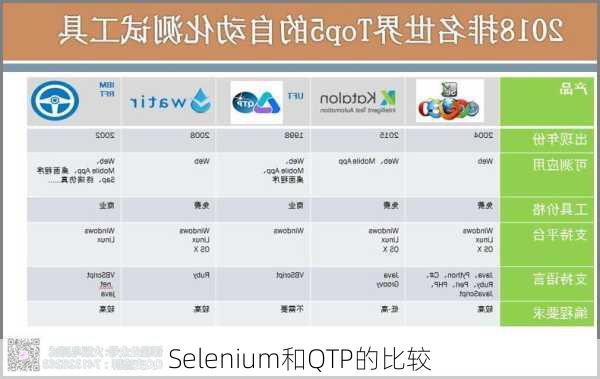Selenium和QTP的比较
1.工具特性比较
Selenium和QTP(现名为UFT)都是自动化测试工具,但它们在以下几个方面有所不同:
Selenium:
开源工具,拥有活跃的社区和支持。
QTP/UFT:

商业软件,由MicroFocus提供专门的技术支持。
Selenium:
主要用于Web应用程序的自动化测试,支持多种编程语言和浏览器,可以在各种操作系统上运行。
QTP/UFT:

支持Web和桌面应用程序的自动化测试,主要针对Windows环境,支持录制和回放测试脚本。
Selenium:
资源消耗较低,支持的编程语言包括Java、Python、C等。
QTP/UFT:

资源消耗较高,主要支持VBScript编程语言。
2.用户体验与操作方式
Selenium和QTP在用户体验和操作方式上也有所差异:
Selenium:
在浏览器后台执行,通过修改HTML的DOM来执行操作,实际上是由JavaScript控制的。对UI组件的支持不够全面。
QTP/UFT:

更加接近真实用户的操作,能提供良好的UI组件支持。通过付费插件可以增强对.NET组件的支持。
Selenium:
可以通过用户扩展UIElement来管理UI对象,但在代码中需要写死,不如QTP内置的对象存储库和恢复方案方便。
QTP/UFT:

内置了良好的UI对象管理和存储功能。
3.与其他工具的集成
Both
Selenium
and
QTP
have
their
own
strengths
in
terms
of
integration
with
other
testing
tools:
with
test
management
tools
Selenium:
提供了丰富的开发环境,可以更容易地与持续集成工具如CruiseControl集成。
QTP/UFT:

可以与HP
Quality
Center
and
TestDirector等测试管理工具集成。
4.成本与发展趋势
Finally,
the
cost
and
future
development
trends
are
important
factors
to
consider:
Selenium:
免费的开源工具。
QTP/UFT:

商业软件,具有一定的成本,包括许可证费用。
development
trends
Selenium:
有着活跃的社区和发展前景,随着Web技术的发展,Selenium在自动化测试领域的地位越来越重要。
QTP/UFT:

继续受到关注,尤其在Windows环境下的自动化测试。MicroFocus的统一功能测试(Unified
Functional
Testing)表明了该产品的发展方向。
In
conclusion,
Selenium
and
QTP
(now
UFT)
both
serve
the
purpose
of
automating
software
testing,
but
they
differ
in
terms
of
licensing,
support,
resource
consumption,
programming
languages,
UI
component
support,
object
storage
and
recovery,
integration
capabilities,
cost,
and
future
development
trends.The
choice
between
the
two
ultimately
depends
on
the
specific
needs
and
priorities
of
the
project
and
the
organization.